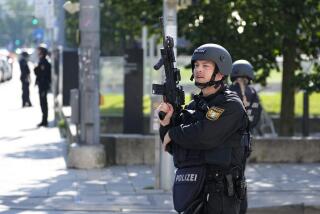Mohammed Oudeh dies at 73; key planner of 1972 Munich Olympics attack
Mohammed Oudeh, the key planner of the 1972 Munich Olympics attack that killed 11 members of the Israeli delegation, died Saturday in Damascus. He was 73.
Oudeh died of kidney failure at Damascus’ Andalus hospital, said his daughter Hana Oudeh.
Oudeh — also known under his guerrilla name Abu Daoud — did not participate in the attack on Sept. 5, 1972. Two Israeli athletes were killed in the assault and nine others died in a botched rescue attempt by the German police. A German policeman and five Palestinian gunmen also were killed.
The Munich attack shocked the world as the most high-profile and brazen assault on a sports team, and later led to a wave of assassinations of top Palestinian officials.
Oudeh was a leader of Black September, an extremist offshoot of the late Palestinian leader Yasser Arafat’s Fatah group that was established to avenge the 1970 expulsion of Palestinian guerrillas from Jordan.
In a 2006 interview, Oudeh said the Munich events were a turning point for Palestinians and rejected the term “terrorists” to describe Palestinian fighters.
“Before Munich, we were simply terrorists. After Munich, at least people started asking, ‘Who are these terrorists? What do they want?’ ” he said. “Before Munich, nobody had the slightest idea about Palestine.”
Oudeh said he had no qualms about the operation because he considered the Israeli athletes, as military reservists, legitimate targets. But he claimed the intent was not to kill the Israelis — rather, to use them as bargaining chips to free more than 200 Palestinians jailed in Israel.
He first acknowledged having a role in the Munich operation in a 1999 book, “Palestine: From Jerusalem to Munich,” which caused an uproar when it came out.
Born in Jerusalem in 1937, Oudeh lived there until the 1967 Mideast war when Israel captured the eastern part of the city. He was displaced and moved to Jordan, where he joined the Palestine Liberation Organization.
After the 1972 attack, Oudeh lived in eastern Europe and then in Lebanon until the Lebanon civil war broke out in 1975. He went back to Jordan, and from there to Ramallah in the West Bank in 1993 after the Palestinians’ Oslo peace accords with Israel.
But when his book on Munich came out, he was banned from returning to Ramallah following a trip to Jordan, and finally settled in Syria — the only country that would take him.
Oudeh escaped death narrowly in what he believed was an attack by Israel’s Mossad spy agency in 1981. He was sitting in a hotel cafe in Warsaw, Poland, when a gunman shot him in his left wrist, chest, stomach and jaw.
He remained militant to the last.
“Today, I cannot fight you anymore, but my grandson will and his grandsons too,” Oudeh said, addressing Israelis.
Survivors include a son and five daughters.
More to Read
Sign up for Essential California
The most important California stories and recommendations in your inbox every morning.
You may occasionally receive promotional content from the Los Angeles Times.










